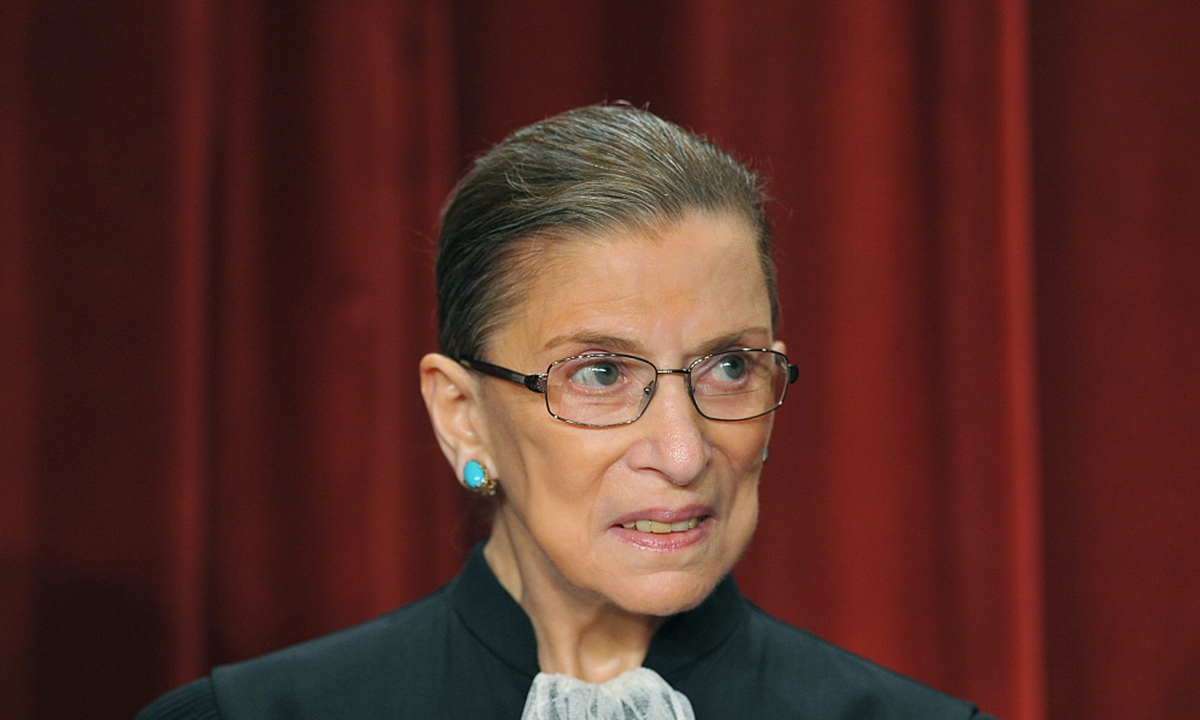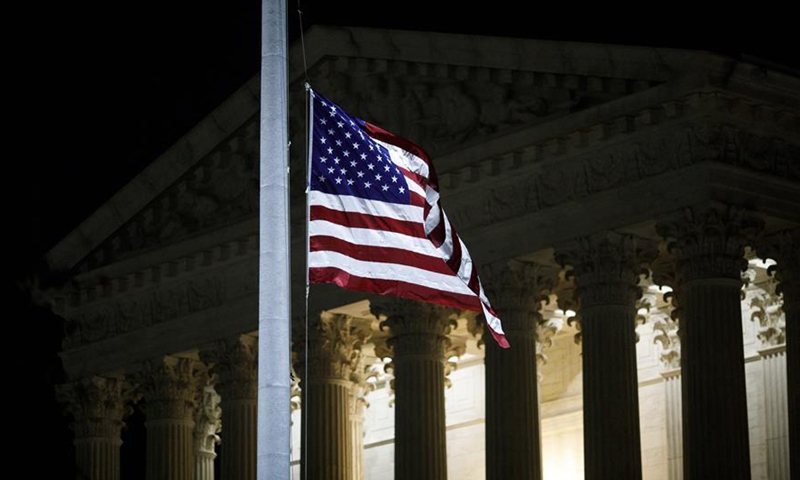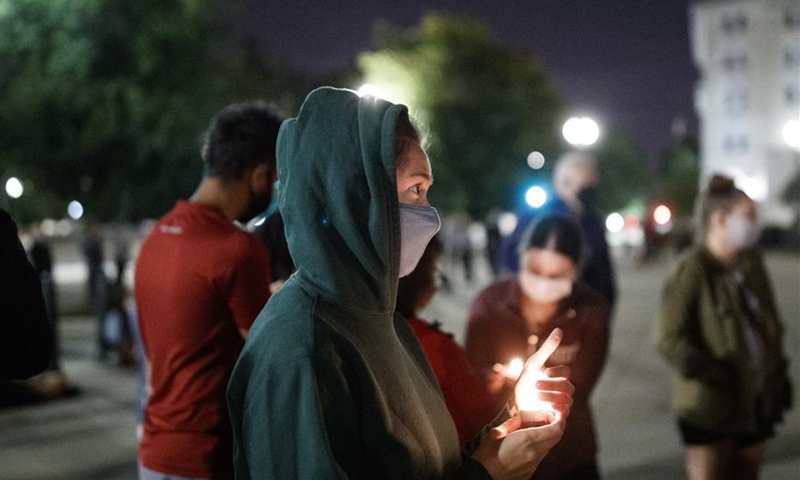
Ruth Bader Ginsburg Photo:VCG
US Supreme Court Justice Ruth Bader Ginsburg has died, the Supreme Court said Friday.
"Associate Justice Ruth Bader Ginsburg died this evening surrounded by her family at her home in Washington, D.C., due to complications of metastatic pancreas cancer. She was 87 years old," the Supreme Court said in a press release.
"A private interment service will be held at Arlington National Cemetery," it added.
The second female justice on the U.S. highest court, Ginsburg was a legal pioneer advocating gender equality. She was appointed in 1993 by then President Bill Clinton and has over the years become the most senior member of the court's liberal wing.
"Our nation has lost a jurist of historic stature," said Chief Justice John Roberts. "We at the Supreme Court have lost a cherished colleague. Today we mourn, but with confidence that future generations will remember Ruth Bader Ginsburg as we knew her -- a tireless and resolute champion of justice."

The U.S. national flag flies at half-mast outside the U.S. Supreme Court following the death of U.S. Supreme Court Justice Ruth Bader Ginsburg in Washington, D.C., the United States, Sept. 18, 2020. U.S. Supreme Court Justice Ruth Bader Ginsburg has died, the Supreme Court said Friday. The second female justice on the U.S. highest court, Ginsburg, 87, was a legal pioneer advocating for gender equality. (Photo by Ting Shen/Xinhua)
Ginsburg has a long history of health problems, having been battling various cancers since 1999, when she was diagnosed with colon cancer.
The late justice underwent a surgery for pancreatic cancer in 2009, had two cancerous nodules removed from her left lung in December 2018, and received additional treatment for a pancreatic tumor in August 2019.
Ginsburg told U.S. media in early January that she was "cancer free," but in July she was treated for liver cancer.
"I have often said I would remain a member of the Court as long as I can do the job full steam," she said in a statement in July 2020. "I remain fully able to do that."
The vacancy Ginsburg left enables President Donald Trump to tap a replacement -- the third Supreme Court justice nominee during his presidency -- that may swing the bench further to the conservative side.
Axios news website cited a top Republican as saying that Trump will move within days to nominate a new Supreme Court Justice. He unveiled a list of 20 candidates on Sept. 9, among them Republican Senators Tom Cotton of Arkansas and Ted Cruz of Texas.
However, Senate Minority Leader Chuck Schumer, a New York Democrat, said shortly after the announcement of Ginsburg's death that the Senate should wait until the next president assumes office to fill the seat left by the late justice. The presidential election will be held on Nov. 3.
"The American people should have a voice in the selection of their next Supreme Court Justice. Therefore, this vacancy should not be filled until we have a new president," Schumer said in a tweet.
Schumer's words echoed those of Ginsberg days before she died. "My most fervent wish is that I will not be replaced until a new president is installed," she said in a statement dictated to her granddaughter, Clara Spera, according to a report by National Public Radio on Friday.

People gather in front of the U.S. Supreme Court mourning the passing of U.S. Supreme Court Justice Ruth Bader Ginsburg in Washington, D.C., the United States, Sept. 18, 2020. U.S. Supreme Court Justice Ruth Bader Ginsburg has died, the Supreme Court said Friday. The second female justice on the U.S. highest court, Ginsburg, 87, was a legal pioneer advocating for gender equality. (Photo by Ting Shen/Xinhua)
While offering his condolences for Ginsburg by highlighting "her extraordinary American life", Senate Majority Leader Mitch McConnell vowed that Trump's nominee to replace Ginsburg "will receive a vote on the floor of the United States Senate."
"In the last midterm election before Justice (Antonin) Scalia's death in 2016, Americans elected a Republican Senate majority because we pledged to check and balance the last days of a lame-duck president's second term. We kept our promise. Since the 1880s, no Senate has confirmed an opposite-party president's Supreme Court nominee in a presidential election year," McConnell said.
"By contrast, Americans reelected our majority in 2016 and expanded it in 2018 because we pledged to work with President Trump and support his agenda, particularly his outstanding appointments to the federal judiciary. Once again, we will keep our promise," the Kentucky Republican continued.
McConnell's decision will set up a fierce election-year battle in the Senate just 46 days away from Election Day. Although Republicans in the Senate, where they hold the majority, changed the rules so that the confirmation of a Supreme Court justice now needs 51 votes rather than a supermajority, there are some vulnerable GOP members facing re-election fights who might not unite with the caucus.
House Speaker Nancy Pelosi ordered flags on Capitol Hill to fly at half-mast until Ginsburg is laid to rest, according to a tweet by California Democrat's spokesman Drew Hammill.
